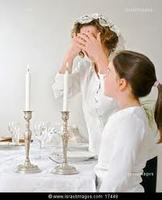
In my generation, many girls found out–not from their mothers, but from talking to friends–about what to anticipate when their body changes. In the backs of buses, during private moments with friends, whispers, giggles, sleepovers, sleep-away camp–that’s where much of the education still takes place today.
As Jewish mothers, don’t we want to be the one to impart the joy and holiness of our femininity to our daughters in a positive light, with a Torah-based philosophy? When the information comes from other young girls, we can’t control the first impressions and associations our daughters will have with their femininity and burgeoning womanhood, where the folklore is passed on like the broken telephone game, with misunderstandings and misinformation along with a variety of immature and negative associations.
Although in previous generations, Jewish girls were likely more sheltered and generally learned what they needed to know from their mothers, we live in a different world today, and the new world requires new approaches (as heard from noted Jewish author and psychiatrist Rabbi Dr. Abraham Twersky).
Jewish mothers who want to talk to their daughters first need to start much earlier than in the pas– not only to pre-empt what they will hear from peers–but also because girls are reaching menarche earlier than ever before. Although pediatricians are baffled by the earlier development in girls, it is not uncommon for them to see signs of puberty by the age of eight.
As a psychologist and director of counseling services at an elite Jewish school in Atlanta, Georgia, I address this important topic by advocating for discussions in frum schools led by Rebbetzins, or female psychologists and medical professionals. More Jewish day schools and Bais Yaakov schools recognize the need to educate our daughters about these important, yet delicate, topics.
The school education, however, should serve to supplement, not be in place of, home-based education. To support mothers, I developed workshops designed specifically for mothers that address the topic of communicating with our daughters, especially about sensitive topics. There are good books available* that mothers can read themselves or read together with their daughters, that can serve as a springboard for conversation and open communication.
Ideally, mothers should start creating an environment of open communication from the earliest age and answer all questions, even about sensitive topics, honestly but age appropriately, and not giving more information than necessary. I recommend the AAA method:
First, make sure that you Answer the question instead of avoiding it. If you look so uncomfortable, a child will learn that there is something wrong with the question and may fear approaching you again. If you are not prepared at that moment to answer an uncomfortable or sensitive question, let your child know that you want time to think it over and give her a specific time when you will discuss it with her.
Next: Ask first. Before giving too much information, probe a bit and ask how the child came up with the question and what they already know. That way, you can address the question accurately and age appropriately.
Finally, Age appropriate yet still Accurate. Parents don’t need to give more information than a child is ready for cognitively and developmentally. Use simple but accurate information. The worst thing a parent can do is give incorrect information and dissolve the trust that the child has in the parent.
Hopefully, with open communication and a trusting relationship, our daughters will know that they can come to us for advice and/or support, especially if and when something serious arises.
Resources:
Miriam Grossman, M.D. (1988) The Wonder Of Becoming You: How A Jewish Girl Grows Up. Feldheim
Sara Diament (2009)Talking to Your Children About Intimacy: A Guide for Orthodox Jewish Parents. Ex Libris Publishing.
Yocheved Debow (2012) Talking About Intimacy and Sexuality: A Guide for Orthodox Jewish Parents,OU Press|KTAV Publishing.
Yocheved Debow and Anna Woloski-Wruble (2008)Yocheved Debow (Author) Life Values and Intimacy Education: Health Education for the Jewish School. Grades 3-8. Tzelem
Rabbi Menachem Mendel Schneerson (1981) Educating Jewish Girls http://www.sichosinenglish.org/essays/73.htm
Pipher (1995) Reviving Ophelia: Saving the Selves of Adolescent Girls.Ballantine Books
Valorie Schaefer (1998) The Care & Keeping of You: The Body Book for Girls American Girl Publishing Inc.
Sarah Lewis-Levy, PhD, is a licensed psychologist/neuropsychologist in Atlanta, GA. She writes and speaks widely on the topics of child development and social/emotional learning programs in Jewish schools. She directed the counseling services in an elite Jewish School in Atlanta and conducts psychological/neuropsychological assessments in private practice. She is spending a sabbatical year in Israel lecturing and developing school-based programs. For more information, visit her website: www.sarahlevy.org.
 Previous
Previous

